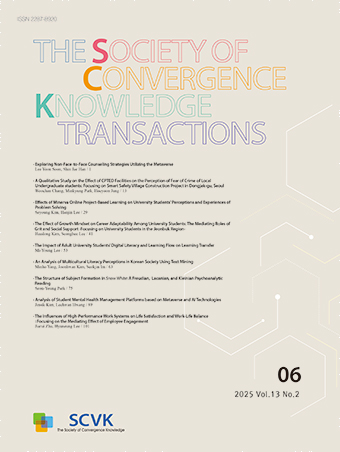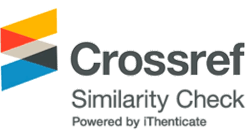Research Article
Abstract
References
Information
본 연구는 간호학생의 DML(Debriefing for meaningful learning) 적용 시뮬레이션 학습경험을 분석한 것이다. 연구참여자는 총 18명이며, 연구방법은 2020년 11월 23일부터 12월 18일까지의 학습경험을 자유롭게 기술한 내용을 분석한 질적 연구 내용분석 방법이다. 연구결과 참여, 탐색, 평가 총 3개의 영역에서 7개의 범주와 13개의 유의미한 진술이 도출되었다. 결론적으로, DML 적용 수업은 학습내용 습득 강화와 지식적용을 위한 심화 발전 기회를 제공한다. 그러므로 다양한 학습에 DML을 적용한 확대 연구를 제언한다.
This study analyzed the learning experiences of nursing students in simulations applying Debriefing for Meaningful Learning (DML). There are a total of 18 research participants, and the research method is a qualitative research content analysis method that freely describes the learning experiences from November 23 to December 18, 2020. As a result of the study, 7 categories and 13 meaningful statements were derived from a total of 3 areas of participation, exploration, and evaluation. In conclusion, DML application class provides opportunities for further development for reinforcement of learning content acquisition and knowledge application. Therefore, it is suggested to expand research by applying DML to various learning.
- B. Trilling, and C. Fadel, "21st Century Skills: Learning for Life in Our Times", Jossey-Bass, 2009.
- H. K. Hur, S. M. Park, Y. H. Sin, Y. M. Im, K. Y. Kim, K. K. Kim, H. O. Choi, and J. H. Choi, "Development and Applicability Evaluation of an Emergent Care Management Simulation Practicum for Nursing Students", Journal of Korean Academic Society of Nursing Education, Vol. 19, No. 2, pp. 228-240, 2013.https://doi.org/10.5977/jkasne.2013.19.2.228
- P. R. Jeffries, "A Frame Work for Designing, Implementing, and Evaluating Simulations Used as Teaching Strategies in Nursing", Nursing Education Perspectives, Vol. 26, No. 2, pp. 96-103, 2005.
- J. Lee, H. Lee, S. Kim, M. Choi, I. S. Ko, J. Bae, and S. H. Kim, "Debriefing Methods and Learning Outcomes in Simulation Nursing Education: A Systematic Review and Meta-analysis", Nurse Education Today, 87, 104345, 2020. doi: 10.1016/j.nedt.2020.104345. Epub 2020 January 16.https://doi.org/10.1016/j.nedt.2020.104345PMid:32135455
- M. K. Fey, D. Scrandis, A. Daniela, and C. Haut, "Learning through Debriefing: Students's Perspectives", Clinical Simulation in Nursing, Vol. 10, No. 5, pp. 249-256, 2014.https://doi.org/10.1016/j.ecns.2013.12.009
- K. T. Dreifuerst, "Getting Started with Debriefing for Meaningful Learning", Clinical Simulation in Nursing, Vol. 11, pp. 268-275, 2015.https://doi.org/10.1016/j.ecns.2015.01.005
- E. J. Kim, and S. J. Kang, "Effects of the Simulation on the Ego Resiliency, Self-Efficacy and Satisfaction of Major of the Nursing Students", Journal of the Korea Academia-Industrial Cooperation Society, Vol. 7, No. 1, pp. 324-330, 2016.https://doi.org/10.5762/KAIS.2016.17.1.324
- M. J. Lee, Y. M. Ahn, and M. S. Cho, "Effectiveness of Simulation Integrated with Problem Based Learning on Clinical Competency and Self-Efficacy in Nursing Students", Child Health Nursing Research, Vol. 20, No. 20, pp. 123-131, 2014.https://doi.org/10.4094/chnr.2014.20.2.123
- Y. I. Han, "Effects of Nursing Simulation-Based Practice Education on Learning Outcomes and Classes Experience in Nursing Students", The Korean Journal of Health Service Management, Vol. 18, No. 1, pp. 135-150, 2014.https://doi.org/10.12811/kshsm.2014.8.1.135
- S. G. Forneris, D. O. Neal, J. Tiffany, M. B. Kuehn, H. M. Meyer, L. M. Blazovich, A. E. Holland, and M. Smerillo, "Enhancing Clinical Reasoning through Simulation Debriefing: A Multisite Study", Nursing Education Perspectives, Vol. 36, No. 5, pp. 304-310, 2015.https://doi.org/10.5480/15-1672PMid:26521499
- 채명옥, "시뮬레이션 교육이 간호대학생의 자기주도 학습능력, 메타인지, 임상수행능력에 미치는 효과", 한국산학기술학회논문지, 제16권 제10호, pp.6832-6838, 2015.https://doi.org/10.5762/KAIS.2015.16.10.6832
- 김미영, 박수현, "간호대학생의 시뮬레이션 기반 교육 시 긴장이 자아효능감 및 자기효능감에 미치는 영향", 성인간호학회 학술대회, pp.186, 2016.
- 김미영, 박수현, 원종순, "간호대학생의 시뮬레이션 교육 시 발생하는 불안정도가 시뮬레이션 교육만족도 자기효능감, 임상수행능력에 미치는 영향", 기본간호학회지, 제23권 제4호, pp.411-418, 2016.
- 백미례, "응급구조학과 학생의 시뮬레이션 경험에 관한 현상학적 연구", 한국응급구조학회지, 제16권 제3호, pp.63-75, 2012.
- J. H. Lee, S. S. Kim, K. S. Yeo, S. J. Cho, and H. L. Kim, "Experiences among Undergraduate Nursing Students on High-fidelity Simulation Education: A Focus Group Study", Journal of Korean Academic Society of Nursing Education, Vol. 15, No. 2, pp. 183-193, 2009.https://doi.org/10.5977/JKASNE.2009.15.2.183
- 손세정, "시뮬레이션 교육이 자기 주도적 학습능력과 학습 몰입 및 문제해결 능력에 미치는 효과", 학습자중심교과교육연구, 제17권 제4호, pp.473-486, 2017.
- 박연경, 김태경, "표준화환자 시뮬레이션기반 조현병 간호교육이 간호학생의 의사소통 자기효능감, 학습 자기효능감 및 실습몰입에 미치는 효과", 예술인문사회 융합 멀티미디어 논문지, 제8권 제6호, pp.437-447, 2018.
- 오윤정, 강희영, "간호시뮬레이션 학습에서 메타인지, 학습몰입 및 문제해결력", 기본간호학회지, 제20권 제3호, pp.239-247, 2013.https://doi.org/10.7739/jkafn.2013.20.3.239
- 오두남, 엄영란, 김춘미, 주세진, 최정현, 박명숙, "간호학생들의 임상실습 대처 경험: '의미 있는 존재가 되기 위해 노력하기'", 한국간호교육학회지, 제22권 제4호, pp.430-440, 2016.https://doi.org/10.5977/jkasne.2016.22.4.430
- 박인희, 신수진, "표준화 환자 시뮬레이션 실습교육에서 동영상을 활용한 동료학습의 효과: 수술 전후 간호를 중심으로", 성인간호학회지, 제27권 제1호, pp.73-82, 2015.
- 김은정, 김영주, 문성미, "시뮬레이션기반 교육시 간호학생이 인식하는 디브리핑에 대한 의미, 반응, 그리고 효과적인 디브리핑 방법", 기본간호학회지, 제24권 제1호, pp.51-59, 2017.
- 강경아, 김성희, 김신정, 이명남, "간호학생이 경험한 시뮬레이션 기반 간호교육의 디브리핑에 대한 내용분석: 호흡곤란증후군 신생아 간호를 중심으로", 아동간호학회지, 제24권 제2호, pp.208-219, 2018.
- 고종현, "시뮬레이션교육이 응급구조와 학생의 기본소생술 수행능력에 미치는 영향", 한국응급구조학회, 제11권 제3호, pp.31-46, 2007.
- 김윤희, 장금성, "시뮬레이션기반 심폐응급간호 교육이 신규간호사의 지식, 임상수행능력 및 문제해결과정에 미치는 효과", 대한간호학회지, 제41권 제2호, pp.245-255, 2011.
- R. P. Cant, and S. J. Cooper, "Simulation-Based Learning in Nurse Education: Systematic Review", Journal of Advanced Nursing, Vol. 66, No. 1, pp. 3-15, 2010.https://doi.org/10.1111/j.1365-2648.2009.05240.xPMid:20423432
- Publisher :The Society of Convergence Knowledge
- Publisher(Ko) :융복합지식학회
- Journal Title :The Society of Convergence Knowledge Transactions
- Journal Title(Ko) :융복합지식학회논문지
- Volume : 9
- No :2
- Pages :39-48
- DOI :https://doi.org/10.22716/sckt.2021.9.2.013




 The Society of Convergence Knowledge Transactions
The Society of Convergence Knowledge Transactions







